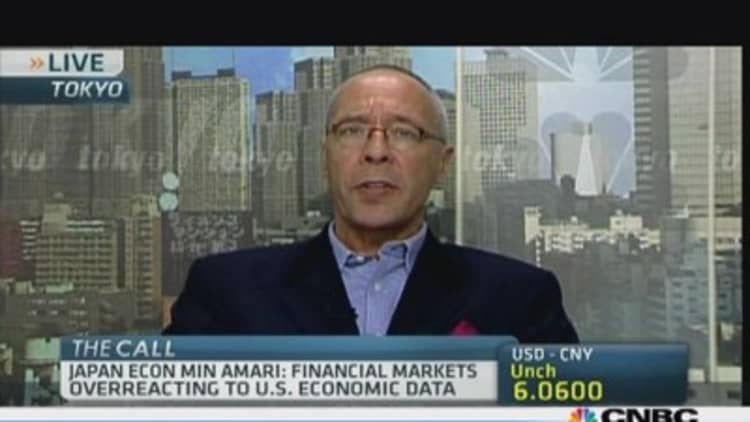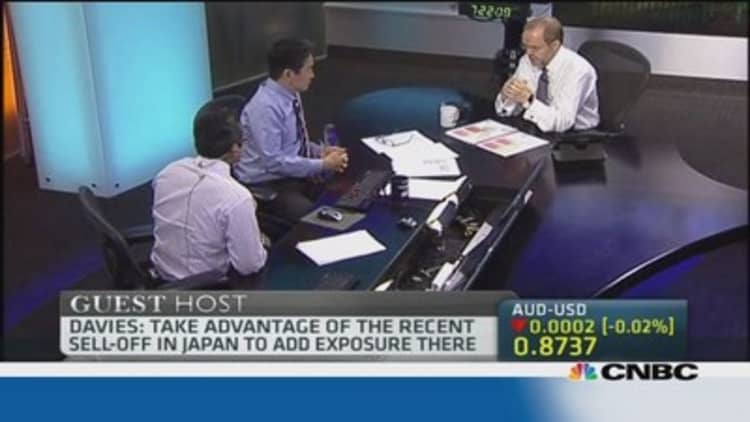
Despite Japan's brighter economic outlook and an improvement in corporate profits, the country's stocks are at the center of a global equity selloff, down 14 percent year to date.
Even with the index's sharp 2014 losses, market watchers aren't ruling out further downside of up to 15 percent over the coming weeks, as heightened risk aversion continues to feed into yen strength, while doubts over further Bank of Japan stimulus measures linger.
(Read more: Asian equities slump after US selloff; Nikkei in correction territory
"From my perspective, the Japan trade has been largely a correlated belief in yen weakness. Clearly that has reversed over the past few weeks... another 10-15 percent [downside] would not surprise me at all," Nicholas Ferres, investment director, Global Asset Allocation, Eastspring Investments told CNBC.
The yen, which is viewed as a safe haven and holds an inverse correlation with the Nikkei and Topix, has strengthened almost 4 percent against the U.S. dollar so far this year amid worries over emerging market troubles and U.S. economic growth.
The Nikkei 225, which fell 4.2 percent to a four-month low on Tuesday, entered a technical correction - defined as a drop of 10 percent or more from the previous peak - a day earlier.
Daryl Guppy, CEO of Guppytraders.com says the index's drop below 14,800 marked a critical trend break, adding that he expects the market to consolidate around the 14,000 level - roughly 2 percent below current levels. He sees 13,200 as a good support level for the market.
It's more than yen strength
The appreciating yen is not solely to blame for the selloff in Japanese equities. Strategists are also pointing to concerns that the country's central bank is becoming complacent in the face of better economic data.
(Read more: Buying opportunities abound as Nikkei falls: Analysts)
"Two-thirds of the down drag in Japanese markets is global spillover, but there are some homegrown sources here. I don't think the concern is the third arrow [of Abenomics]. It's the first arrow - monetary policy - because it has become very clear over the past couple of weeks that the Bank of Japan is at risk of becoming complacent, they don't think there's any need to step on the accelerator to achieve that 2 percent inflation target," said Jesper Koll managing director and head of Japanese equity research at JPMorgan Securities.

Last week, Japan reported a 1.3 percent on-year rise in its nationwide core consumer price index (CPI) for the month of December, a sign that the economy is making progress on ending years of deflation.
"And at the end of the day it is money that makes the world go round, not regulatory policy," Koll added.
Kenji Abe, chief Japan equity strategist at Citigroup Global Markets, however, believes that the country's improving economic fundamentals will limit downside in the market.
"There's no reason to sell on Japanese fundamentals like corporate earnings or economy," said Abe, who sees the market slipping no more than 5 percent from current levels.
Meanwhile, Russ Koesterich, Global Chief Investment Strategist at BlackRock, sees the market plunge as an attractive buying opportunity for long-term investors.
(Read more: Japan's inflation uptick puts 2% target in sight)
"Japanese stocks have been hit hard in the last few days mostly because the concerns about emerging markets have led to a flight to quality which has strengthened the yen," he said.
"I think the long-term direction of yen is down and that [Japanese stocks] is one place where we would recommend buying on weakness," he added.
—By CNBC's Ansuya Harjani. Follow her on Twitter:@Ansuya_H


